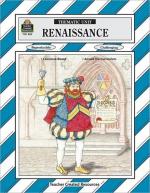|
This section contains 5,732 words (approx. 20 pages at 300 words per page) |

|
Humanism.
In Italy humanism was the dominant intellectual movement of the fourteenth and fifteenth centuries, and its methods affected most areas of cultural life. The early humanists Francesco Petrarch (1304–1374) and Giovanni Boccaccio (1313–1375) had been fascinated by the genres and literary style of Latin Antiquity. They envisioned a revival of culture based upon ancient literary models. As the humanist movement developed, it acquired a new sophistication about the role and uses of language. This sophistication gave birth in the fifteenth century to philology, a new discipline that studied the historical and contextual uses of languages in ancient documents. Philology developed rigorously scientific methods that by the second half of the fifteenth century allowed scholars to establish the authenticity of ancient texts. At about the same time, humanism also supported a revival of the study of ancient rhetoric as well as the...
|
This section contains 5,732 words (approx. 20 pages at 300 words per page) |

|




